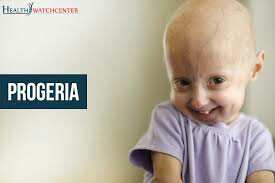Progeria is a rare genetic condition that causes a person to age prematurely. Children with progeria appear healthy, but by the age of 2 years, they look as if they have become old too fast.
There are different types of progeria, the common type is known as Hutchinson-Gilford progeria syndrome (HGPS).

Children with this condition live on average for 14 years, because of the likelihood of developing atherosclerosis.
Around the world, 134 children are thought to have progeria across 46 countries. It is believed to affect 1 in every 4 million newborns of both sexes and all ethnicities.
Thirty years ago, little was known about the cause of the disease. In 2003, a progeria gene was discovered. This has given hope that a cure might one day be found.
Causes of Progeria
Most children with this disease have a mutation on the gene that encodes for lamin A, a protein that holds the nucleus of the cell together. This protein is also known as progerin.
The defective protein is thought to make the nucleus unstable. This instability makes cells more likely to die younger, leading to the symptoms of the disease.
It seems to happen because of a rare genetic change. One parent may have the mutation, even though they do not have the disease.
There is not usually any family history, but if there is already one child in the family with progeria, there is a 2 to 3 percent chance that another sibling will have it.
Genetic testing can show whether a parent has a mutation or not.
Signs and Symptoms of Progeria
A newborn with this disease looks healthy, but by the age of between 10 months and 24 months, features of accelerated aging start to appear.
Signs include:
- limited growth and short stature
- lack of body fat and muscle
- loss of hair, including eyelashes and eyebrows
- early signs of skin ageing, including thin skin
- stiffness in the joints
- visible veins
- narrow, wrinkled, or shrunken face
- slow and abnormal tooth development
- a high-pitched voice
- limited range of motion and possible hip dislocation
- generalized atherosclerosis, leading to cardiovascular and heart disease
Tests may also show signs of insulin resistance, but cholesterol and triglyceride levels should be normal.
Progeria does not impact the child’s brain development or intelligence, and it does not mean a higher risk of infection. It does not affect motor skills, so children with the condition can sit, stand, and walk like any other child.
Children from any ethnic background can have it, but they will have a similar appearance.
Diagnosis of Progeria
A doctor may suspect progeria by observing the signs and symptoms, for example, aging skin and hair loss.
A test for HGPS is available. This can make diagnosis and treatment possible from an earlier age.
Treatment of Progeria
Occupational therapy can help to address joint stiffness.
There is no cure for progeria, but occupational and physical therapy can help the child keep moving if their joints are stiff.
Heart health is critical for people with progeria, so the doctor may prescribe statins, nitroglycerin for angina, and routine therapy for congestive heart failure.
Eating healthily and getting regular exercise are important.
Some patients may have cardiac surgery to slow the progression of heart disease.
Self-care tips may include eating different foods when the lipid, or fat, profile begins to change, and eating small meals regularly to maximize calorie intake.
Sunscreen is important for protecting the skin, and padding in shoes can help minimize discomfort caused by a lack of fat padding on the body.


